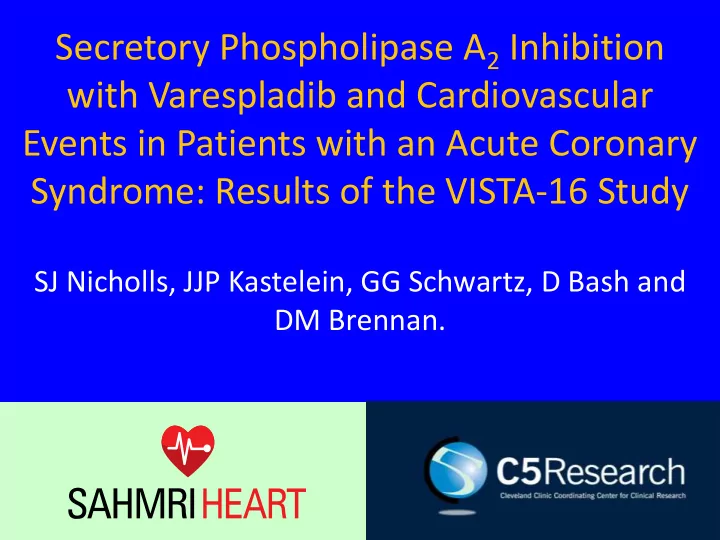

Secretory Phospholipase A 2 Inhibition with Varespladib and Cardiovascular Events in Patients with an Acute Coronary Syndrome: Results of the VISTA-16 Study SJ Nicholls, JJP Kastelein, GG Schwartz, D Bash and DM Brennan.
Disclosures • Research support: AstraZeneca, Amgen, Anthera, Eli Lilly, Cerenis, Novartis, Resverlogix, InfraReDx, Roche and LipoScience • Consulting and honoraria: AstraZeneca, Eli Lilly, Anthera, Omthera, Merck, Takeda, Resverlogix, Sanofi-Aventis, CSL Behring, Esperion, Boehringer Ingelheim • VISTA-16 was sponsored by Anthera
Residual Risk and Inflammation • Despite current evidence-based treatment, cardiovascular risk remains high following an acute coronary syndrome (ACS) • Pathologic studies indicate that inflammation plays a role in atherosclerosis and biomarkers suggest that anti-inflammatory effects may contribute to the benefit of statins. • However, to date no specific anti-inflammatory agent has been demonstrated to be cardioprotective
Secretory Phospholipase • Secretory phospholipase A 2 (sPLA 2 ) is a circulating family of enzymes which generates bioactive lipid species implicated in inflammatory pathways • sPLA 2 has been identified in atherosclerotic plaques where it is thought to play a pathogenic role • Varespladib is a pan-sPLA 2 inhibitor that demonstrated favorable effects on lipid and inflammatory markers in phase 2 studies • The impact of varespladib on cardiovascular outcomes is not known
Objective To determine the effect of the sPLA 2 inhibitor varespladib on cardiovascular outcomes in patients treated for the first 16 weeks following an acute coronary syndrome
VISTA-16 6,500 patients within 96 hours of an ACS Varespladib 500 mg Placebo • Treated for 16 weeks in addition to atorvastatin and established medical therapies • Primary endpoint: cardiovascular death, myocardial infarction, stroke, hospitalization for unstable angina
VISTA-16 Trial: Flow of Patients 5,391 patients screened and 5,145 patients treated at 362 centers in Europe, Australia, New Zealand, India and North America Placebo (n=2573) Varespladib 500 mg (n=2572) 16 weeks treatment 12.7% early discontinuation 14.3% early discontinuation At a pre-specified interim analysis including 212 (55%) of projected primary endpoint events the DSMB recommended termination of the trial for futility and possible signals of harm Sponsor collected 6-month survival data in 1588 (31%) of patients
Clinical Characteristics Placebo Varespladib Parameter (n=2573) (n=2572) Mean age in years 60.7 61.0 Males 74.3% 73.1% Caucasian 88.5% 88.4% Mean body mass index 29.6 29.8 History of hypertension 77.8% 75.2% History of diabetes 31.3% 31.3% Current smoker 33.6% 33.4% Prior myocardial infarction 29.6% 30.2% Prior PCI 18.6% 17.7% Prior CABG 7.1% 6.3% Prior lipid modifying therapy 36.5% 35.8%
Baseline Characteristics Placebo Varespladib Parameter (n=2573) (n=2572) Index diagnosis STEMI 46.9% 47.4% non-STEMI 38.0% 37.4% Biomarker negative unstable angina 15.1% 15.3% Hours to randomization 57.0 57.6 Revascularization for index event 80.3% 82.8% Concomitant Medications Aspirin 91.3% 91.8% Ticlopidine, clopidogrel, prasugrel 76.2% 76.0% Beta-blocker 83.9% 82.9% ACE inhibitor or ARB 82.5% 82.3%
Biochemistry Placebo Varespladib P Value (n=2573) (n=2572) Baseline Values LDL-C (mg/dL) 105.1 105.0 0.94 HDL-C (mg/dL) 43.2 43.3 0.81 Triglycerides (mg/dL) 153.0 154.0 0.52 CRP (mg/L) 10.4 11.4 0.06 Percentage Change from Baseline LDL-C -25.1% -28.8% 0.008 HDL-C 5.4% 5.1% 0.77 Triglycerides -20.3% -21.7 0.059 CRP -82.1% -85.0% 0.008
Primary Efficacy Endpoint Cardiovascular death, myocardial infarction, stroke, hospitalization for unstable angina % % 8 8 Placebo Placebo Varespladib 500 mg Varespladib 500 mg 6 6 4 4 2 2 HR (95% CI) = 1.25 (0.97, 1.61) HR (95% CI) = 1.25 (0.97, 1.61) log-rank p-value = 0.08 log-rank p-value = 0.08 0 0 0 2 4 6 8 10 12 14 16 0 2 4 6 8 10 12 14 16 Time (Weeks) Time (Weeks) No. at Risk: Placebo 2573 2474 2361 2255 2166 2062 2000 1927 1646 Varespladib 2572 2467 2360 2241 2160 2038 1967 1883 1641
Secondary Efficacy Endpoints Placebo Varespladib P (n=2573) (n=2572) Value CV death, MI, stroke 3.8% 4.6% 0.04 CV death 1.4% 1.5% 0.54 MI 2.2% 3.4% 0.005 Unstable angina 1.4% 1.9% 0.47 Stroke 0.6% 0.4% 0.81 6-month mortality 2.0% 2.7% 0.15 P values from log rank test. CV: cardiovascular, MI: myocardial infarction
Myocardial Infarction % % 4 4 Placebo Placebo Varespladib 500 mg Varespladib 500 mg 3 3 2 2 1 1 HR (95% CI) = 1.66 (1.16, 2.39) HR (95% CI) = 1.66 (1.16, 2.39) log-rank p-value = 0.005 log-rank p-value = 0.005 0 0 0 2 4 6 8 10 12 14 16 0 2 4 6 8 10 12 14 16 Time (Weeks) Time (Weeks) No. at Risk: Placebo 2573 2487 2379 2277 2189 2090 2030 1957 1672 Varespladib 2572 2477 2376 2258 2180 2059 1991 1909 1662
Subgroup Analysis: Primary Endpoint P Value for Interaction 0.28 0.42 0.47 0.29 0.09 0.84
Subgroup Analysis: Myocardial Infarction P Value for Interaction 0.38 0.24 0.17 0.06 0.04 0.17
Adverse Clinical and Biochemical Events Placebo Varespladib Parameter (n=2573) (n=2572) Discontinuation due to 36 72 adverse events ALT/AST >3x ULN 6 38 Bilirubin >2x ULN 4 1 CK >3x ULN 9 6 Creatinine >ULN 84 64 ALT: alanine transaminase; AST: aspartate transaminase; CK: creatine kinase
Conclusions • Varespladib did not reduce cardiovascular morbidity or mortality after ACS. • Rather, a harmful effect of varespladib was observed, with an excess rate of myocardial infarction, appearing early during the treatment period. • Varespladib administration was associated with modest incremental reduction of LDL-C and CRP, but a greater incidence of liver enzyme elevations. • The findings call into question whether sPLA 2 is a valid target of therapy in atherosclerosis.
Available at www.jama.com
A Final Thought • Despite early promising findings in biomarker studies, varespladib proved to be harmful. • This highlights the importance of ultimately performing outcome trials of novel agents. • The search for an effective anti-inflammatory therapy for vascular disease continues.
Recommend
More recommend